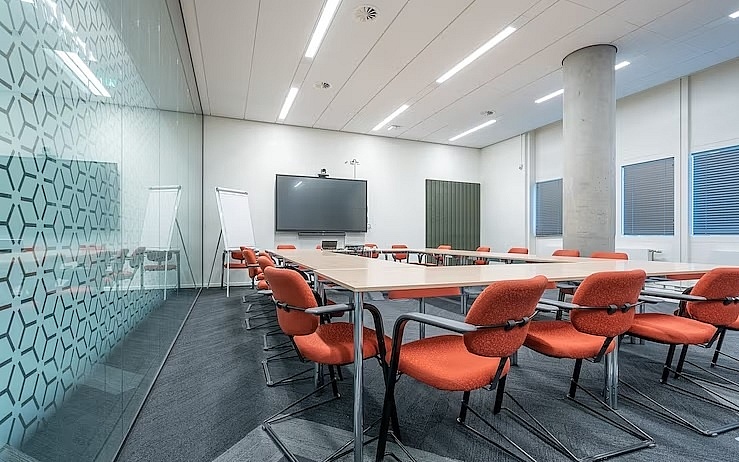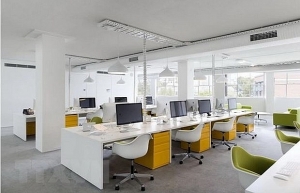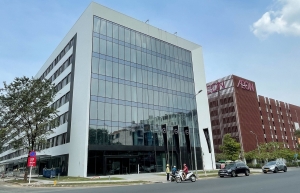Myriad of incentives made in order to tempt office tenants
 |
| Myriad of incentives made in order to tempt office tenants, illustration photo/ Source: freepik.com |
Hoai Nam, founder of media startup 4-Star, based in Ho Chi Minh City with less than 10 employees, last month received a notice of incentives for services such as extra meeting room hours, and more printing and photocopying credits at his co-company’s working space in District 4.
Each month, Nam pays VND3 million ($125) per person excluding taxes and fees for his work location in District 4. The rate was reduced by 25 per cent two years ago. “With the same space, it cost $333 per person in District 1, and I could not afford it. Everyone is cutting costs as it is such a difficult time,” Nam said.
In addition to reducing rates, Nam said her landlord was improving facilities and service incentives, so that tenants could extend their contract for a longer term. For example, more greenery is being arranged between desks, and free parking is now offered.
Knight Frank Vietnam in August announced the findings of its 2023 flex-space study into the growth and development of the serviced office and coworking sector in Ho Chi Minh City. The annual study revealed a 16 per cent increase in leasable floor space sector-wide across the southern metropolis and a commensurate fall in overall occupancy and asking rents.
July saw the city offering a total of 95,300 square metres of space, 12,800 more than last year, with the 2023 citywide average occupancy of 81 per cent, down 5 per cent from the year prior.
The statistics indicate that average asking rents for private offices within flex spaces fell by 34 per cent to $209 per person per month, while monthly hot-desk rates have similarly fallen by 35 per cent to $139, likely due to the increase in supply seeing operators offer lower rates to pull in tenants.
This makes the level of market competition increasingly high, forcing shared office companies to actively offer preferential policies, upgrade space, and even lower rents.
Aside from reducing rates, some flexible chains are continuously renovating their spaces to draw in customers.
The new Sentry P location in Thao Dien is developing purpose-built spaces to entice and address the needs of the burgeoning creative industries.
This includes design, music and video production, and other media. Sentry P is furnished using recycled and sustainable materials, and the facility boasts Fitwell Certification and even a robotic cocktail maker.
“This connection and sense of community has been key to our success at The Sentry. We are very selective about who we will let in as part of our internal commitment to create spaces of like-minded people and companies. This is why we host functions in our dedicated event zones to further foster this spirit,” said The Sentry’s CEO Greg Ohan.
Ohan added that Vietnam’s younger demographics don’t necessarily translate well to work-from-home and hybrid working models, despite their popularity among many Gen Z workers.
“The hybrid model is a little ahead of its time in Vietnam as younger team members will often need the mentorship and guidance of senior staff, and the inspiration, connection and collaboration that an in-person work environment provides,” he said.
Leo Nguyen, director of Occupier Strategy and Solutions at Knight Frank Vietnam, said that a reputable brand, impressive office facilities and amenities, stylish design, and prime locations were seen as a winning recipe for coworking operators.
“Many companies are also looking for the flexibility to scale their businesses up or down - and coworking and serviced office operators are well positioned to offer this flexibility,” Nguyen said.
The numbers bear this out, with central business district (CBD) coworking occupancy rates tracking at nearly 80 per cent and emerging business and entrepreneurial centres such as Thu Duc city averaging even higher occupancy rates of around 87 per cent.
This is significantly higher than other non-CBD districts and wards, such as Phu Nhuan and Tan Binh, which are often only half occupied.
This reflects both an increased demand for prime locations by larger tenants, and of smaller occupiers looking to be surrounded by like-minded businesses and the support infrastructure that some of the more established operators can offer – particularly at a time when new enterprise registration has declined by 0.5 per cent on-year in the first half of 2023.
 | Office merry-go-round strikes as tenants deal with adversity After devastating retail and hospitality sectors in the real estate market, the COVID-19 pandemic has expanded its negative impact to offices for lease, where many tenants are narrowing their spaces or moving to lower grades. |
 | Hanoi’s office market increasingly attractive to foreign tenants: Savills Hanoi Hanoi’s office market is said to be more attractive than its counterparts in other Southeast Asian cities and even in the Asia-Pacific region because of cheaper rentals and greater supply, according to real estate consultants Savills Hanoi. |
 | OfficeHaus complex attracts tenants in Ho Chi Minh City OfficeHaus, a newly built complex in Celadon City, is attracting interest from companies shifting from traditional central business districts. |
What the stars mean:
★ Poor ★ ★ Promising ★★★ Good ★★★★ Very good ★★★★★ Exceptional
Related Contents
Latest News
More News
- Fairmont opens first Vietnam property in Hanoi (February 04, 2026 | 16:09)
- Real estate investment trusts pivotal for long-term success (February 02, 2026 | 11:09)
- Dong Nai experiences shifting expectations and new industrial cycle (January 28, 2026 | 09:00)
- An Phat 5 Industrial Park targets ESG-driven investors in Hai Phong (January 26, 2026 | 08:30)
- Decree opens incentives for green urban development (January 24, 2026 | 11:18)
- Public investment is reshaping real estate’s role in Vietnam (January 21, 2026 | 10:04)
- Ho Chi Minh City seeks investor to revive Binh Quoi–Thanh Da project (January 19, 2026 | 11:58)
- Sun Group launches construction of Rach Chiec sports complex (January 16, 2026 | 16:17)
- CEO Group breaks ground on first industrial park in Haiphong Free Trade Zone (January 15, 2026 | 15:47)
- BRIGHTPARK Entertainment Complex opens in Ninh Binh (January 12, 2026 | 14:27)

 Tag:
Tag:



















 Mobile Version
Mobile Version